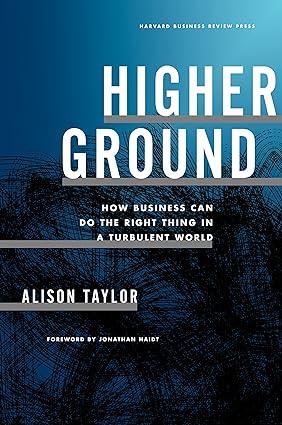Higher Ground
How business can do the right thing in a turbulent world


Alison Taylor is a clinical professor at NYU Stern School of Business and the Executive Director at Ethical Systems, a research collaboration of prominent business school professors working on ethical culture, founded by social psychologist Jonathan Haidt. She has spent over two decades advising large multinationals on risk, corruption, sustainability and organizational culture.
As the author notes in her introduction: ‘It is easy to say companies should register a positive impact and help societies flourish, or listen to stakeholders to balance their interests. The devil lurks in how.’ At the same time it is a need that requires to be actioned – and business executives who have been successful in their careers and have reached the top of the hierarchy, have most likely not done so with the skillset that is now required. Today’s complex, inter-connected world of societal challenges and ecosystems requires something new.
While most executives are familiar with Adam Smith’s Wealth of Nations and the ideas of competitive advantage, far fewer know of, let alone have read his first great work The Theory of Moral Sentiments. Business decision-makers are more expert on economics than moral philosophy as a rule. We know how to read a balance sheet when it is tracking dollars, but mechanisms to measure ethics and societal benefits are much less clear.
This road is strewn with contradictions and dilemmas, as Taylor observes ‘companies are expected to balance conflicting stakeholder interests and demands: to follow clear global principles while adapting to local conditions and cultures; to solve societal problems while maintaining shareholder value; and to be transparent and authentic, with no empty talk or inconsistencies.’ It is easy to understand that when faced with these competing demands executives opt for following the money, which is how the system is still predominantly structured and they are rewarded. It takes a special kinds of altruist to do otherwise – and they are rarely found at the peak decision-making positions.
The author is a business school professor however – and as such is tasked with finding a pragmatic, and teachable, route forward through this morass of complexity and contradictions. It is also worth reminding ourselves that all corporate titans are also humans, most with children of their own who frequently will challenge them – they have conduits to societal reality, even if the corporate world is good at making them difficult to access at work.
Taylor is realistic and pragmatic. ”corporate responsibility’ and ‘sustainability’ often describe corporate efforts to offset prior damage wrought by core business models by offering sunny, distracting narratives…. corporations must cater to a powerful appetite for accountability… [which means] that corporations must be more candid and realistic about problems they suggest they can take on.’ At the same time she admonishes the habit of manipulating and undermining legal, political and regulatory institutions to serve corporate interests.
The first part of the book describes how we got here and what tools currently exist to deal with these situations. Part two is where the new thinking begins. New thinking in a fairly ancient sense, for we are talking here about ethics and human behaviour and the themes needing to be practiced could also have been found on the Temple at Delphi – such as gaining trust by practicing humility and curiosity.
Taylor is more granular when it comes to setting priorities; she presciently identifies that there will always be more to do, if you set sail towards being the most sustainable organization in the globe you will never be able to focus on anything else. It is important to identify the sustainable priorities that are core to your identity and mission as an organization – assess what is relevant with a materiality assessment.
Other areas she tackles with similar detail are tackling corruption, corporate political responsibility and managing transparency without losing credibility.
Part three – and this is why we like this book – Taylor acknowledges that strategy is only the start, the real graft comes in managing the culture and your people, setting the conditions for change and adopting new mindsets. In the conclusion she illustrates this with a case from BP and an employee who was disillusioned post-Deepwater, left, challenged the leadership and then returned when invited to lead their ‘purpose’ initiative.
Ultimately this is a book about culture. How organizations will only change in a meaningful, enduring way – and be able to reap the benefits of that – if the senior leadership creates the conditions for change to happen. No-one will make long-term, socially beneficial decisions in an organization if they know that they are, after the fancy talk and greenwash window-dressing is removed, only ever judged on a single line in the balance sheet: profit.
It starts with top leaders, but it needs to be woven through the whole business at every level. It’s not that every employee should be able to recite the sustainable values of the corporation, it is that they should feel them; they should know that ‘doing the right thing’ in the book’s subtitle, is the right thing to do for the business, the investors, the community they operate in – and for themselves.
Higher Ground is another clarion call for business leaders to enable their organizations to operate in a different way. Taylor expertly sets out the challenges and the practices they will encounter and need to adopt. It should be read by everyone who aspires ‘to do the right thing’ in their organization.
Title: Higher Ground: How business can do the right thing in a turbulent world
Author/s Name/s: Alison Taylor
Publisher: Harvard Business Review Press
ISBN: 978-1-647-8234-36
Publishing Date: February, 2024
Number of Pages: 280